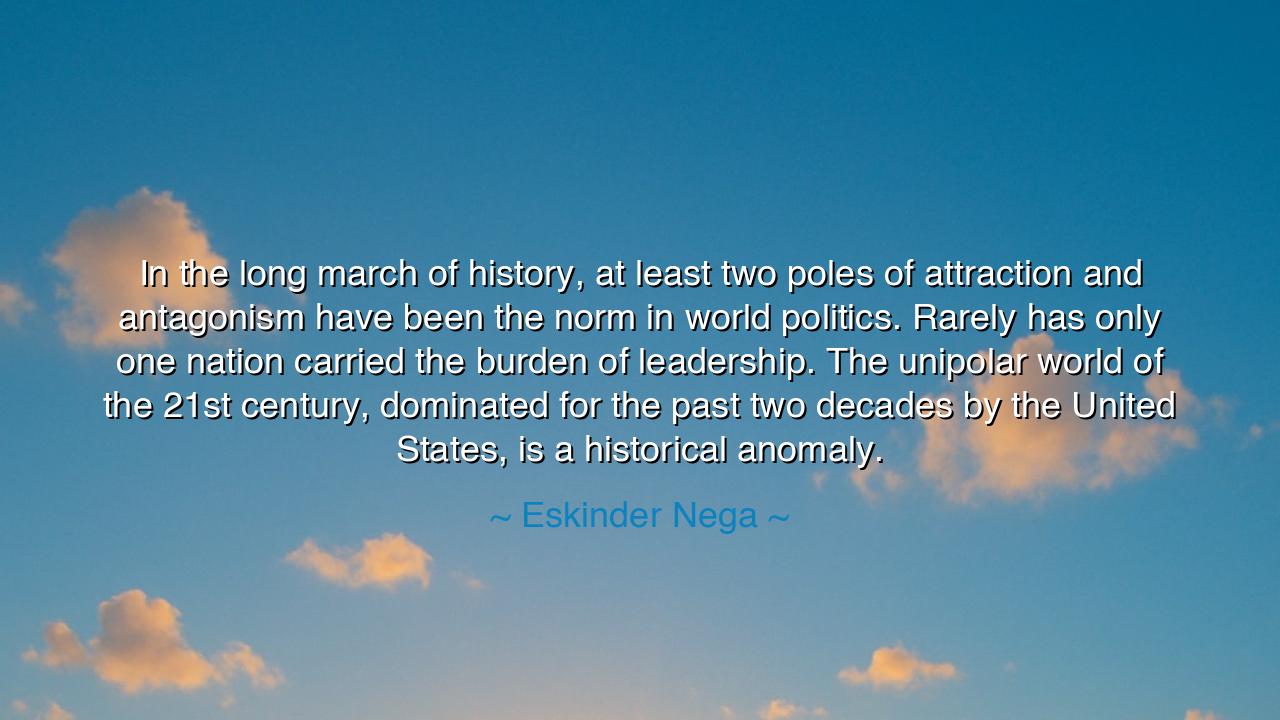
In the long march of history, at least two poles of attraction
In the long march of history, at least two poles of attraction and antagonism have been the norm in world politics. Rarely has only one nation carried the burden of leadership. The unipolar world of the 21st century, dominated for the past two decades by the United States, is a historical anomaly.






The imprisoned journalist and truth-teller Eskinder Nega once wrote: “In the long march of history, at least two poles of attraction and antagonism have been the norm in world politics. Rarely has only one nation carried the burden of leadership. The unipolar world of the 21st century, dominated for the past two decades by the United States, is a historical anomaly.” In this reflection, he lifts our gaze from the noise of the present to the long arc of civilizations, teaching that the struggle for balance among powers is the enduring rhythm of the world.
Nega reminds us that throughout history, there has rarely been a time when a single power reigned without rival. The mighty kingdoms and empires always found themselves opposed, balanced, or challenged by another. Rome had its Carthage, and later its Parthia. Byzantium faced Persia, then Islam. The empires of Europe lived in constant struggle, each checking the ambition of the other. In this dance of rivalry, the world found both conflict and equilibrium, for power that is unbalanced tends to corruption, while power that is checked is compelled to wisdom.
But Nega calls our attention to the unipolar world of recent decades, where the United States has stood as the single pole of authority after the fall of the Soviet Union. For a time, it carried the mantle of global leadership alone—its armies unchallenged, its culture pervasive, its economy unrivaled. Yet he warns: such dominance is not the normal condition of mankind. It is an anomaly, a fleeting season in the vast march of time. Just as other empires believed themselves eternal and discovered their limits, so too must this moment be understood as temporary, not permanent.
History itself testifies to this warning. When Napoleon Bonaparte strode across Europe, it seemed as though France would rule alone. Yet the coalition of nations rose against him, and the dream of one pole collapsed. When the British Empire spanned the globe, it declared that the sun would never set upon its dominion. Yet within decades, rivals arose, wars erupted, and that supremacy waned. So it is with every power that stands alone—the tides of history inevitably summon a counterbalance.
The meaning of Nega’s words is both sobering and wise: do not mistake a moment of supremacy for a permanent order. The United States may have borne the burden of leadership in the early 21st century, but already other poles of attraction and antagonism rise—China, Europe, resurgent Russia, regional powers, and the restless voice of peoples once ignored. The world tends toward balance, and any attempt to deny this truth courts upheaval.
The lesson, O seeker of wisdom, is this: recognize the cycles of power and prepare for change. A wise nation uses its season of strength not for arrogance, but for building a just order that can endure when rivals appear. A wise people do not cling blindly to supremacy, but invest in alliances, cooperation, and mutual respect, so that when the balance shifts, they do not stand alone. For the mark of greatness is not eternal dominance, but the ability to shape peace amid rivalry.
Practical action follows: in your own life, as in nations, do not rely on being unchallenged. Expect resistance, expect rivals, expect the balance of forces to change. Prepare yourself not by clinging to power, but by cultivating wisdom, justice, and resilience. Just as the world always seeks equilibrium, so too must your own life seek balance—in strength and humility, in ambition and service.
Thus, Eskinder Nega’s words resound as a reminder and a prophecy: “The unipolar world… is a historical anomaly.” Take heed, for history is not the story of eternal supremacy, but of shifting tides. Those who see this truth and act with humility and foresight may endure. Those who ignore it and cling to dominance as destiny shall find themselves swept away by the relentless march of time.






AAdministratorAdministrator
Welcome, honored guests. Please leave a comment, we will respond soon